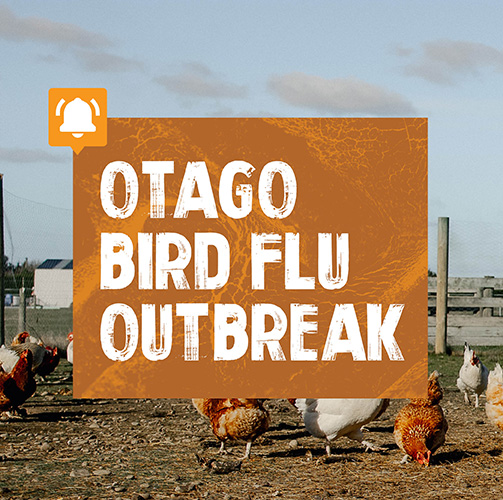

9th December 2024
The recent news of a bird flu outbreak may be worrying for poultry owners and rural communities. While a high-pathogenic strain of avian influenza (H7N6) has been confirmed on one - or possibly two farms - in rural Otago, steps are being taken to contain the situation and protect both commercial and backyard flocks.
The strain found (H7N6) is not the more concerning H5N1 strain which has been killing poultry, wild birds and mammals in other parts of the world and the appearance of H7N6 in Otago does not increase the likelihood of H5N1 appearing here in New Zealand. There are no human health or food safety concerns, and eggs and poultry products are safe to consume when properly cooked.
To help you safeguard your chickens and your peace of mind, we’ve put together some resources and practical advice here, including biosecurity tips and product recommendations. Whether you’re an experienced poultry farmer or keep a few hens at home, we’ll help you get through this.
Helpful ideas from Farmlands:
By following these guidelines and using recommended products, Farmlands can help commercial poultry owners protect their flocks and help maintain egg production during a bird flu outbreak.
Disinfectants
- Virucidal disinfectants: Products like Virkon™ S are effective against a wide range of pathogens, including avian influenza. Regular disinfection of boots, equipment and surfaces is essential. Consider cleaning equipment, vehicles and machinery before they enter your property to prevent pathogen spread.
Protect flocks with enhanced nutrition: enrichment and stress reduction:
From rearing chicks to buying lay birds, Farmlands has the feed to meet their requirements.
Biosecurity practices for poultry and aviary owners
MPI remain confident that they are on the tight track for stamping out the H7N6 strain, however good biosecurity on farm is still a good idea to increase to protect your birds.
1. Keep your equipment and poultry yard or aviary clean.
- Use gloves, clean and sanitise often.
- Remove litter, sand and grit from the aviary between batches of birds, and every few months for resident birds.
- Thoroughly clean concrete floors, walls and aviary wire with soapy water, and then apply a disinfectant.
- Clean and disinfect feed and water containers regularly.
- Don't share equipment with other bird keepers unless it has been thoroughly cleaned and disinfected.
2. Avoid contact between your birds and wild birds.
- Restrict access to open ponds, lakes and creeks (shared spaces with wild birds)
- Restrict access to your birds’ food
- Consider netting and adding a roof on a run around chicken coop to restrict contact with wildlife.
- Clean up surrounding areas to reduce shelter and hiding places for wild birds.
3. Don't let feed and water become contaminated
- Keep chicken/bird feed and water sources under cover and away from wild birds.
- Ensure water supplied to birds is from a chlorinated mains water supply, a clean bore, or treated appropriately if these sources aren't available.
- Don't allow wild birds or pest animals to contaminate your birds' feed. Store it in a container with a secure lid.
For bird fanciers
- Always thoroughly wash your hands with soap before and after handling birds.
- Clean your footwear and wash clothing regularly and avoid using the same clothing and footwear around your own birds if you have visited other flocks or events such as shows.
- Do not take any birds to a show if there are signs of illness in your flock.
- All bird equipment and permanent carrying containers should be cleaned and disinfected before and after a show.
- At shows, avoid handling birds other than your own, if possible.
- At home, show birds should always undergo a period of quarantine before returning to the flock.
- Keep a register of all bird movements in and out of your premises.
For specific product availability, visit your local Farmlands store or shop online. It’s also wise to establish a comprehensive biosecurity plan tailored to your property’s needs.
Information:
Here’s a selection of items and biosecurity measures that might be useful. At this stage, masks and other PPE may not be necessary, keep an eye out for the latest advice from MPI and Biosecurity.
New Zealand Resources:
- Ministry for Primary Industries (MPI): Offers updates on bird flu risks, hotline details for reporting sick or dead birds, and best practices for farmers. Explore MPI Resources
- Egg Producers Federation of NZ: (prepping for H5N1)
- Biosecurity New Zealand: Provides guidelines for preventing avian influenza outbreaks, updates on restrictions, and biosecurity measures to protect poultry and wildlife. Visit Biosecurity New Zealand
- Poultry Industry Association of New Zealand (PIANZ): Offers tailored advice for poultry farmers, focusing on best practices for biosecurity and handling potential outbreaks. Visit PIANZ
- Royal Society Te Apārangi: Summarizes the risks and preventive measures against bird flu in New Zealand, including discussions on global trends and implications for local wildlife and farming. Learn More at the Royal Society
Global Resources:
- World Organisation for Animal Health (WOAH): A comprehensive resource for global updates on avian influenza outbreaks and strategies for managing animal health risks. Visit WOAH
- Food and Agriculture Organization of the United Nations (FAO): Provides global data and strategies for managing bird flu, with a focus on food safety and animal health. Visit FAO’s Bird Flu Resources
- Centres for Disease Control and Prevention (CDC): Offers information about avian influenza’s potential human health impacts and safety guidelines. Visit CDC’s Avian Flu Page